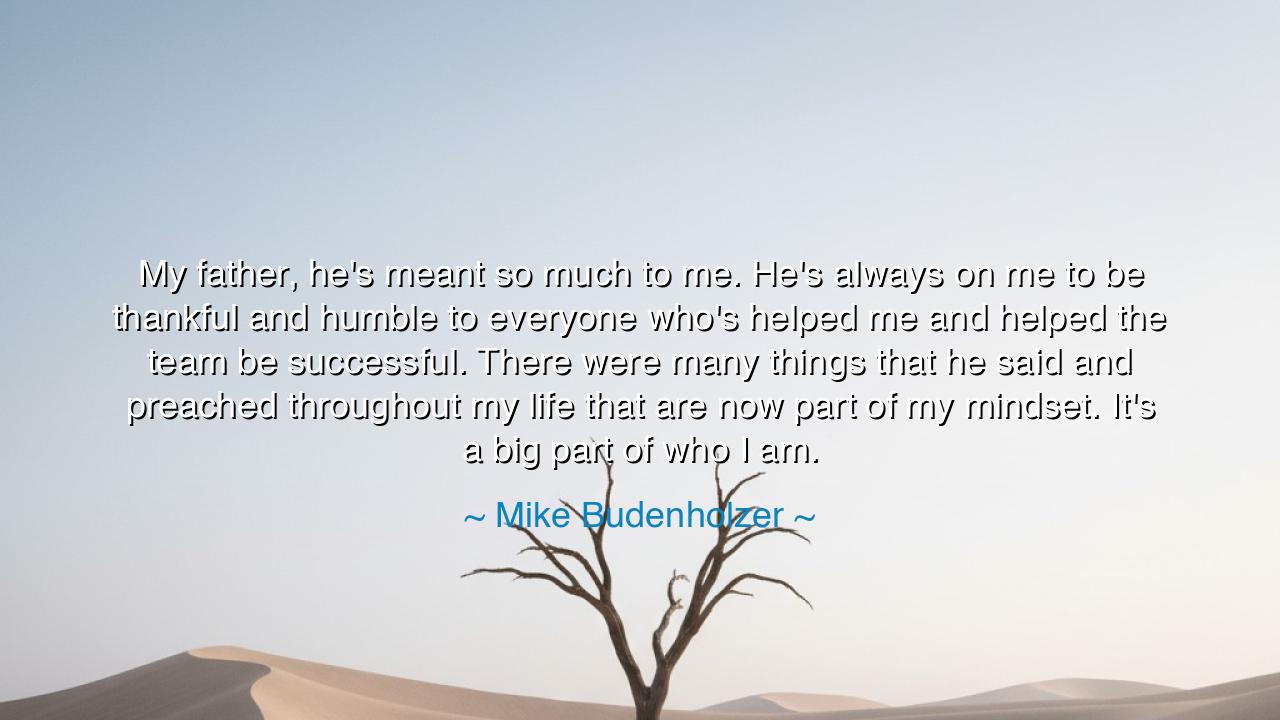
My father, he's meant so much to me. He's always on me to be
My father, he's meant so much to me. He's always on me to be thankful and humble to everyone who's helped me and helped the team be successful. There were many things that he said and preached throughout my life that are now part of my mindset. It's a big part of who I am.






Hear, O children of tomorrow, the words of Mike Budenholzer, who spoke with reverence: “My father, he’s meant so much to me. He’s always on me to be thankful and humble to everyone who’s helped me and helped the team be successful. There were many things that he said and preached throughout my life that are now part of my mindset. It’s a big part of who I am.” These are not the idle sentiments of a man recalling the past, but the testimony of one whose very soul has been shaped by the wisdom of his father. They speak of gratitude, of humility, and of the eternal inheritance passed from parent to child, from teacher to student, from one generation to the next.
The origin of these words is found in the household of Budenholzer’s youth, where a father’s voice guided the son with steady counsel. His father was not only a parent but a mentor, who pressed upon him the importance of being thankful for every hand that supported him and every voice that encouraged him. The lesson was not merely about kindness but about perspective: to see success not as an individual crown, but as the fruit of a community’s effort. This teaching, repeated and lived out, sank deep into the heart of the son until it became the very mindset that now directs his life and leadership.
Consider the story of Marcus Aurelius, emperor of Rome, who in his Meditations gave honor to his teachers, to his mother, to his mentors, and most especially to his adoptive father, Antoninus Pius. Though Marcus wielded the greatest power on earth, he acknowledged that his wisdom, his self-control, his sense of duty were not born in him alone but were gifts instilled by those who raised him. His humility in giving thanks to his father’s example is a mirror to Budenholzer’s words, reminding us that the foundation of greatness is often laid by unseen hands in the quiet years of youth.
The emphasis on humility is no small matter. To be humble is not to deny one’s strength, but to recognize that strength has roots. The player may shine, but it is the coach, the trainer, the teammate, and the family that sustain his light. To be reminded, again and again, “Be humble, be thankful,” is to carry within oneself an anchor that prevents the soul from being carried away by pride. In Budenholzer’s confession we see that this anchor was tied by his father’s hand, and through it the son remains steady even in the storms of competition and achievement.
What lesson does this hold for us? It is this: that we must guard the voices we listen to, for they become part of who we are. The teachings of Budenholzer’s father became living truths in his son’s character. Likewise, the words we hear in our youth, whether of bitterness or of wisdom, plant seeds in the garden of our hearts. If they are seeds of thanksgiving and humility, they will grow into trees of strength and honor. But if they are seeds of arrogance and ingratitude, they will bear bitter fruit. Therefore, we must cherish the voices of wisdom and silence the voices of folly.
And yet, gratitude must not remain only in memory. To honor one’s father, one’s teacher, or one’s mentor is not only to repeat their words but to live them. The wise child becomes the living legacy of the parent’s teaching. When Budenholzer speaks of his father’s sayings as “a big part of who I am,” he shows us that the highest honor we can pay to those who raised us is not a statue or a song, but a life that embodies their wisdom.
Therefore, O listener, let your practice be thus: remember those who shaped you, and give thanks for them. Speak words of gratitude to them if they yet live; honor their memory if they have departed. Then take their teachings and make them flesh in your daily actions—be humble when praised, be thankful when aided, and give credit to the many unseen hands that support your journey. In this way, you carry their wisdom forward, and like Budenholzer, you become not only a child of your father but a teacher for the generations that follow.
So let this truth shine within you: we are shaped not by ourselves alone, but by the voices that guide us. To be thankful and humble is not weakness, but the mark of a noble soul. Carry this wisdom as your inheritance, and you will leave behind a legacy as enduring as the one Budenholzer received from his father.






AAdministratorAdministrator
Welcome, honored guests. Please leave a comment, we will respond soon